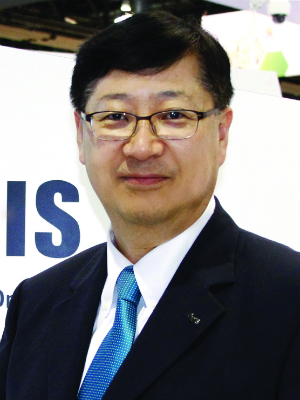a&s recently conducted a series of interviews with Korean companies to gain a better understanding of the security manufacturing landscape in Korea.
a&s recently conducted a series of interviews with Korean companies to gain a better understanding of the security manufacturing landscape in Korea.
The Chinese manufacturers' economies of scale and low margins have made competition in mass market products extremely difficult. However, recent trade tensions between the U.S. and China has spurred discussions on whether Taiwanese and Korean manufacturers, both previous powerhouses in surveillance manufacturing, will enjoy a boon in sales. Though some of our interviewees did comment that the ongoing trade war could be an opportunity for Koreans to gain back market share, Most companies we've talked to said it will not have any impact on their business.
Therefore, Korean companies are moving to differentiate and grow in the market through various strategies, such as strengthening their brand offerings, focusing on relatively niche markets and expanding their reach into other lucrative markets as well. By actively seeking expansion opportunities in overseas markets, Korean companies are positioning themselves as ready alternatives to Chinese products.
Building a global brand
Companies like Commax, IDIS and Suprema are good examples of Korean companies that have continued to expand globally while developing their branded offerings.
Commax: IoT and smart home
Video door phone manufacturer
Commax has been expanding its footprint overseas and developing its smart home product line. Currently, its main overseas market is in the Middle East, followed by Asia, U.S. and European countries, with a strong focus on the residential vertical, specifically single house and multi-tenant communities. The company's strong presence in the Korean domestic market gives it the backing it needs to continue developing and selling its new smart home IoT products.
Looking forward, IoT will remain the company’s future focus. At the moment, the company sells IoT-connected products that use the video door phone as the main control interface and sensors like gas detectors, motion detectors, alarms and cameras.
"We see two main trends: The first is that control of the systems are moving to mobile phones, and the second is the availability of AI. We are now working with companies like Google and IBM to use AI to manage the house for you in a 'tailored' and more energy-efficient way," said Kisang Lee, Marketing Director for Commax.
"With the goal of delivering value that users can actually feel, we at Commax use our imagination to develop products for a more convenient and safer home, with a wide range of smart living solutions built around it. Our concept of the smart home goes beyond just the physical space of a house. We want to connect technologies and expand services so that even local-based convenience services and functions can be easily used at home," said Lee.
IDIS: Critical failover capabilities and cybersecurity
 Joon Jun,
Joon Jun,
Executive VP at IDIS
“A few ye a r s ago,
IDIS embarked on a mission to build a global video surveillance brand and this effort has started bearing fruit. Our branded business has grown over 50 percent per year in the last two years. Most of the growth originated in Europe, and the company’s global footprint has expanded, growing from 15 partners to 58 global partners,” said Joon Jun, Executive VP at IDIS. In Asia, the company has established a good network in Singapore, Indonesia, the Philippines and Japan, and is now looking for partners in Malaysia, Vietnam and Thailand.
Although IDIS still maintains its ODM business, this part of the company operates selectively, with a preference for high level ODM projects. Joon sees system reliability and cybersecurity as main key points that are critical to integrators and end users. “I believe IDIS’ critical failover capabilities and cybersecurity give us an advantage over Chinese products.”
Looking into the future, IDIS is focused on the development of its own deep learning analytics. “Video analytics will become a strong offering for us in the next five years. This is still a virgin market that is now ‘re-starting.’ Video analytics has already been present for years, but their low accuracy has led to low adoption due to many false alarms. Deep learning can help mitigate this and we are planning on launching the next version during the next ISC West,” added Joon.
Suprema: Complete access control solution
Korean biometrics company
Suprema has been focused on expanding its product offerings beyond biometric readers to offer a complete access control solution. “Growth has been even across the world, ranging between 10 to 15 percent. The Middle East and Europe are very strong in several verticals like construction, time and attendance, health care and data centers,” explained Andy Ahn, Head of Marketing for Suprema. The growth has also prompted Suprema to expand its partner network, looking for bigger distributors and integrators that can support its growth across the world.
“There is a growing demand for facial recognition and mobile credentials. Resistance to biometrics is lower now since people are used to the concept of biometrics to unlock their smartphones and therefore acceptance is growing,” added Ahn.
Finding niche markets
Concentrating on one particular section of the market can allow a company to find new opportunities and tailor its products to specialized needs. It can then use this to distinguish and differentiate itself from others in the market.
CMI-Tech: Iris recognition and biometrics
 Philip Tusa,
Philip Tusa,
COO of CMI-Tech
CMI-Tech is a Korean company specializing in iris recognition, a biometric s modality that utilizes the unique pattern in each person’s eyes for positive identification. Founded in 2009, the company launched its first product in 2012. CMI-Tech differentiates all of its offerings by their ease of use. The main applications for their products include access control, time attendance, immigration control, health care and national ID programs. The company is also actively working on new and innovative use cases in the financial services market.
“Our systems are constantly being improved to offer a natural, intuitive and fast solution that makes it easier to use for subjects, especially non-acclimated ones,” said Philip Tusa, COO of CMI-Tech. “We believe that by optimizing the user experience, the adoption of biometrics across a wide range of applications can only grow.”
The company is also active in markets across the world, but especially in Southeast, the Middle East and Turkey. They have also gained wide acceptance in India’s biometrics-based national ID project called UID or Aadhaar. Other notable successes included the Colombia trusted traveler program called BIOMIG at Bogota airport for returning citizens, as well as the staff access control project at South Korea’s Incheon Airport in Seoul.
“Iris recognition offers distinct advantages over widely prevalent fingerprint readers. However, a significant portion of the biometrics market wants contactless and touchless solutions as well as the very high accuracy offered by iris. Our new EF-45 system also works very well with users who have facial coverings like surgical masks, clean room garments and female face veils. Iris recognition is ideal for demanding applications like these,” added Tusa.
UNINET: High channel NVRs
UNINET, a company focusing on high channel NVRs, is another example of this approach. Founded in 2016, the company is focused on developing high-channel (32 to 64 channels) embedded NVRs as well as on software development and customized mobile and remote viewing. "Selling low channel NVRs is a very competitive market, but there is potential in high channel NVRs where we can offer customization for our clients," said James Ha, CEO of UNINET.
"The product is a very good fit for co-working with peripheral devices like elevators and offers a good solution for apartment buildings where there are many cameras or a big box retail store like Costco. The product is significantly cheaper than a VMS system and offers more benefits compared to getting multiple low channel NVRs,” he said. Ha added that UNINET's products are being widely sold domestically and in Japan, with plans to expand this into North America in the near future.
VIVAKOREA: Capture cards for hybrid surveillance
VIVAKOREA is another company that is focused on eliminating the need for hardware replacements and allowing customers continued use of coaxial cabling. The company has developed a capture card to create a hybrid surveillance system that can support up to 64 analog and IP cameras. "Choosing a capture card makes integration with other systems like point of sale, alarms or access control easier," explained Christine Hong, Manager for the Overseas Sales Team at VIVAKOREA. "The product targets monitoring and guard companies that have existing coaxial cabling in place already and thus, can reuse the existing infrastructure."
Expanding into new industries
A noteworthy phenomenon in the Korean security industry is the shift among security players to different industries.
Many companies are spinning off products or shifting to other industries that also require expertise in video systems. Most noticeable is the move into the automotive industry. The continuous development of autonomous cars and the growing use of advanced driver assistance systems (ADAS) was a big push for the vehicle camera market (there are now usually 8 to 12 cameras per car). The rising use of in-vehicle cameras (either pre-installed or after-market ones) as well as predictions that autonomous driving will drive camera counts in cars are pushing manufacturers to enter this new field.
Daiwon: Security camera lens
 Michael Lim,
Michael Lim,
Sales and Marketing Manager,
Imaging Optics Overseas
Sales Department at Daiwon
An example of such a transition is lens manufacturer
Daiwon. Within the security sector, Daiwon sells to manufacturers of machine vision cameras as well as those interested in niche applications like for smart homes (producing low-priced, compact-size wide angle lenses) and iris recognition. “Daiwon was founded in 1988 as a lens manufacturer specializing in security cameras. Due to competition with Chinese manufacturers, the company decided to shift to the automotive industry. The move started about three years ago and now the company has passed long-term reliability tests and started supplying to tier 1 automotive manufacturers,” explained Michael Lim, Sales and Marketing Manager, Imaging Optics Overseas Sales Department at Daiwon.
Huvitech: Vehicle safety hardware and software
Another good example of a company that serves both markets is Huvitech, which stands for Human Vision Technology. "The company was founded in 2006 and focuses on vehicle security, servicing both the security and the automotive market through making recorders and dash cams," said Kevin Lee, CEO of Huvitech.
Their products are being sold in 27 countries, including Australia, Europe and Japan. About 25 percent of sales are domestic and 75 percent are to export markets. Apart from supplying auto manufacturers, the company is also focused on the transportation vertical. It has established a good industry presence for producing cameras and recorders for school buses and police patrol cars, and is now expanding into new markets like small boats, ferries and vehicles for construction sites which need equipment that can withstand vibration, corrosion, etc.
Moving beyond hardware, the company has also been investing in tracking and real-time monitoring software. “In three to five years from now, our focus will be on fleet management systems. The main vertical for this solution is trucking, garbage trucks, police cars, fire engines,” said Lee. He added that the solution will be launched in February or March 2019.
Nextchip: Specialized ISP for automotive market
One more example of this is
Nextchip, a semiconductor supplier for video surveillance. The company provides image signal processors (ISP) that ensure high definition video quality for imaging systems. In response to tough competition by Chinese manufacturers and rising demands from the automotive market for specialized ISP, the company decided to split itself into two entities: the existing security business and an automotive segment, which Nextchip estimates will exceed the former within two years.
"There will still be a strong correlation between the two product groups as there is possible spillover between the two segments. Manufacturers in the surveillance market ask for more intelligent functions like object detection and tracking, object classification and other features which are also being developed for our ADAS product group. The technology developed in the automotive division could also be beneficial for surveillance products in the future," explained Sophie Jeon, Manager of the Strategic Marketing Department at Nextchip.